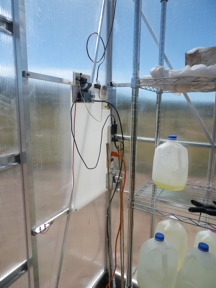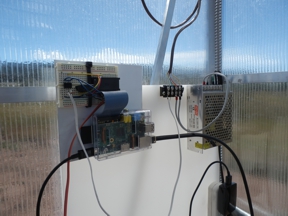

● Overview
● Sys Arch
● Vent Ctrlr
● Fan Ctrlr
● Eq Int Module
►Env Manager
● Results
● Future Plans
● Survey
Greenhouse Automation - Environment Manager The Environment Manager consists of a Raspberry Pi single-board computer (with standard USB 5 VDS power supply) executing custom software and augmented with an external RS485 communication driver and an external humidity/temperature sensor. In the prototype installation the Raspberry Pi inside of a commercial enclosure is mounted in a corner of the greenhouse (see area picture below on the left, close-up on the right). In the close-up picture, the Raspberry Pi and external components are left of center and 12 VDC 10A power supply is right of center.
The custom software monitors the greenhouse temperature (currently using the external sensor) and uses this data, along with the time of day, to manage the temperature of the greenhouse. It accomplishes this by sending commands to the controllers using the Raspberry Pi serial port (routed through the external RS485 communication driver) that open or close the greenhouse vents, turn the circulating fan on or off, or set the speed of the exhaust fans. This functionality will be enhanced when the thermal controller is deployed to provide more precise temperature readings and control thermal storage water circulation. The Raspberry Pi is a full-featured computer with monitor output, keyboard and mouse support, audio output, USB device and ethernet connectivity, and many other capabilities. Currently the prototype system is 'headless'—any changes to the system are effected through a network connection. Future plans are to equip the Pi with a small touch screen and speaker so that greenhouse management data and settings can be viewed and adjusted. Also, because the Raspberry Pi is surrounded by a large world-wide community of users and employs a variation of the Linux operating system, it offers a wide range of programming languages and methods. Since the connection to the controllers is through the serial port, any of these languages or methods could potentially be used to create a custom greenhouse management application. Or for that matter, an entirely different computing platform could be used, such as an Arduino, instead of the Raspberry Pi. |
||||
|
This page last revised on 05/05/2018 |

